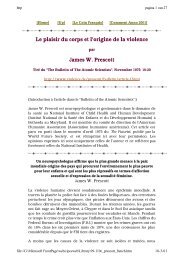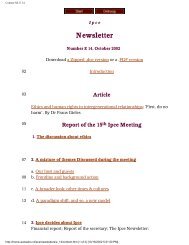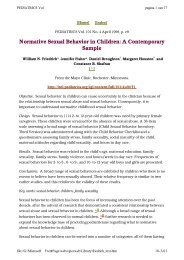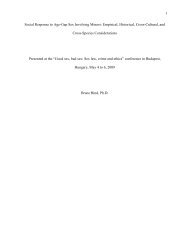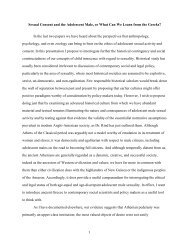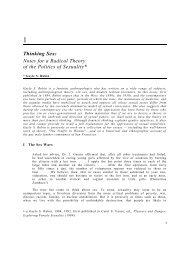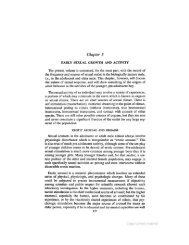Infant and Child Sexuality: A Sociological Perspective - Ipce
Infant and Child Sexuality: A Sociological Perspective - Ipce
Infant and Child Sexuality: A Sociological Perspective - Ipce
You also want an ePaper? Increase the reach of your titles
YUMPU automatically turns print PDFs into web optimized ePapers that Google loves.
Outcomes of Preadolescent Sexual Encounters--General<br />
What is the effect of engaging in various kinds of sexual encounters<br />
in preadolescence? No simple, categorical answer can be given to<br />
this question, for the encounters are varied in quality, <strong>and</strong> authentic<br />
empirically-based evidence is inadequate for answering the question.<br />
According to Ford <strong>and</strong> Beach, societies that severely restrict adolescent<br />
<strong>and</strong> preadolescent sex play, those that enjoin girls to be modest,<br />
retiring, <strong>and</strong> submissive appear to produce adult women who are incapable<br />
or at least unwilling to be sexually aggressive. The feminine products<br />
of such cultural training are likely to remain relatively inactive<br />
even during marital coitus. And, quite commonly, they do not experience<br />
complete <strong>and</strong> satisfying orgasm. In contrast, the societies which<br />
permit or encourage early sex play usually allow females a greater degree<br />
of freedom in seeking sexual contacts. Under such circumstances<br />
the sexual performance of the mature women appears to be characterized<br />
by a certain degree of aggression, to include definite <strong>and</strong> vigorous activity,<br />
<strong>and</strong> to result regularly in complete <strong>and</strong> satisfying orgasm. This<br />
is a large claim, it would appear to be logical given what we now know<br />
about socialization in general, but it would require more rigorous empirical<br />
evidence before such cause-effect relationship could be accepted<br />
as fact. It is a sweeping generalization that should be treated<br />
as hypothesis rather than as established fact. Adequate evidence to<br />
support the generalization is not at h<strong>and</strong> nor is evidence to disprove<br />
it. (Ford <strong>and</strong> Beach, 1951, p. 266).<br />
Case histories of preadolescents are not wanting in support for the<br />
idea that good instruction in sexuality is desired <strong>and</strong> desirable.<br />
Adequate sex information when I was in grade<br />
school could have prevented many, many agonizing<br />
experiences <strong>and</strong> granted me many more years<br />
of dating fun. Only a person as naive as I was<br />
might become horrified at a delay in their<br />
menses <strong>and</strong> think they have become pregnant by<br />
being too close to a sweating boy. I did!<br />
Although it was not until my later years that my<br />
interests became heterosexual, interest in the<br />
basic facts of sex developed very early in the<br />
formative years. Basic attitudes were instilled at<br />
this age, e.g., interest in the genitals <strong>and</strong><br />
breasts, curiosity about the origin of babies, <strong>and</strong><br />
the indecency of the naked body. Since many of my<br />
ideas about sex were ill-founded <strong>and</strong> because much<br />
of the instruction I received was not satisfactory<br />
or complete, I can agree with some sociologists<br />
who point to preadolescence as a vital stage<br />
of life for learning about sex <strong>and</strong> who call for<br />
more complete <strong>and</strong> knowledgeable instruction at a<br />
younger age than it is now offered.<br />
In analyzing my sex education in the home, I<br />
must admit it has been somewhat on the lean<br />
side; however, being fairly well read, having<br />
access to both church <strong>and</strong> school libraries, as<br />
well as the usual “street corner” sources, I<br />
126



